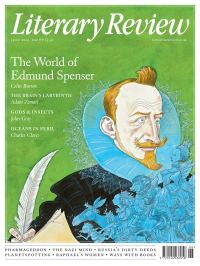Paul Bailey
From the Black Diaries
The Dream of the Celt
By Mario Vargas Llosa (Translated by Edith Grossman)
Faber & Faber 404pp £18.99
The Dream of the Celt begins and ends in Pentonville Prison in the summer of 1916, where the Irish nationalist Roger Casement waits to hear if he will be hanged as a traitor. There are substantial reasons why he should receive a last-minute pardon, given his exemplary record as a consul in King Leopold’s deeply corrupt Congo and his fearless investigation into the shady dealings of Julio C Arana’s London-based Peruvian Amazon Company. He has fought a long, noble battle against the exploitation, by greedy Europeans, of the indigenous peoples of Africa and South America. His detailed and entirely disinterested reports on the savage treatment of the men and women forced to work in degrading conditions for the accumulation of rubber have led to him receiving a knighthood for services to the humanitarian cause. These huge achievements, which have already assured him a place in history, have recently been undermined by his fanatical involvement with those determined to liberate Ireland from the British yoke. To this end, he has sought the cooperation of the Germans in supplying weapons to his fellow patriots – perhaps the one seriously misguided venture in an otherwise commendable public life.
It is clear from the outset that Mario Vargas Llosa holds this complex man in high regard. He depicts Casement as someone made heroic by virtue of his refusal to accept even the mildest injustice. In both the Congo and Peru, he is acquainted daily with the likelihood of his

Sign Up to our newsletter
Receive free articles, highlights from the archive, news, details of prizes, and much more.@Lit_Review
Follow Literary Review on Twitter
Twitter Feed
It wasn’t until 1825 that Pepys’s diary became available for the first time. How it was eventually decrypted and published is a story of subterfuge and duplicity.
Kate Loveman tells the tale.
Kate Loveman - Publishing Pepys
Kate Loveman: Publishing Pepys
literaryreview.co.uk
Arthur Christopher Benson was a pillar of the Edwardian establishment. He was supremely well connected. As his newly published diaries reveal, he was also riotously indiscreet.
Piers Brendon compares Benson’s journals to others from the 20th century.
Piers Brendon - Land of Dopes & Tories
Piers Brendon: Land of Dopes & Tories - The Benson Diaries: Selections from the Diary of Arthur Christopher Benson by Eamon Duffy & Ronald Hyam (edd)
literaryreview.co.uk
Of the siblings Gwen and Augustus John, it is Augustus who has commanded most attention from collectors and connoisseurs.
Was he really the finer artist, asks Tanya Harrod, or is it time Gwen emerged from her brother’s shadow?
Tanya Harrod - Cut from the Same Canvas
Tanya Harrod: Cut from the Same Canvas - Artists, Siblings, Visionaries: The Lives and Loves of Gwen and Augustus John by Judith Mackrell
literaryreview.co.uk